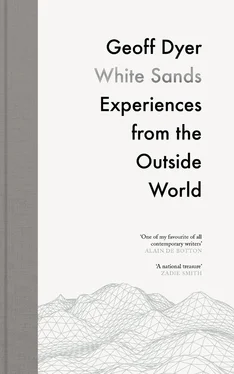We continued walking until there were poles on all sides, surrounding us, but because they were a long way apart — so far apart one could easily forget they were there — it was the opposite of feeling hemmed in, as if by a forest. Still, it was difficult to detect any pattern or order, and unless you were right next to a pole there was nothing much to look at. The most eye-catching objects were the cabin and the windmill. The cabin was low and squat, hugging the ground, determined to stay put in the face of whatever forces — meteorological, economic — might try to persuade it to budge. Our approach was different. We moved away from each other, in different directions. Being here encouraged us to separate, but we all felt this urge and so the urge to be separate was shared, communal. It was seeing the others, realizing how far away they were, that brought home how far into the distance the poles extended.
The sky was still nothing — no cloud, no anything. Perhaps the poles played a part in this. We rely on scenarios and correspondences to make sense of the world. It was very windy. If there had been a flag it would have blown out straight, proud and American, and there was a suggestion of flag because of the abundance of poles and wind, but there were no flags. It wasn’t just that there happened not to be any flags. There was an implied absence of flags.
‘We’re a small number of people in a very large space,’ Ethan said, walking to within talking distance. ‘The poles make you come back to a single question: what difference do the poles make? Their effect is both slight and absolute.’ We were standing side by side, looking into the distance, Western-style, and then we drifted apart again. The wind was strong enough to make the poles quiver, as if shivering from the cold.
At some point everyone convened at the cabin. I was the last man in and could see the other members of our expedition sitting on the wooden porch, in wooden rockers and on wooden benches, drinking champagne, watching me walk towards them. It was the kind of hut you see in Walker Evans’s photographs from the 1930s. What had seemed noble but squalid then seemed idyllic now, especially with the champagne and laughter.
‘In a way it’s the greatest boutique hotel in the world,’ said Jessica as I joined them on the porch. She was right. There were none of the things that make a place horrible: damp carpet in the bathrooms, depressing curtains or floral bedspreads. There was just this wooden cabin, shelter in a shelterless world.
As the sun moved though the absent sky the poles sprouted shadows. The tips sparkled as if stars had perched on them. The sun began to drop towards the horizon; the poles became far more clearly defined. Perspective became an issue in that there was none. Or, rather, there were so many competing perspectives that they complicated each other and cancelled each other out. Though still slender, the poles acquired bulk, solidity, which they did not have before. They were far more visible now and there were far more of them. Even the ones which were a good way off were brighter. It was obvious, as well, that they had been planted in rows. If you positioned yourself next to one and looked past it you could see a dozen more, glowing, almost like a fence that could keep nothing out, that let everything through, namely the sunlight and the wind. In each direction there were poles arranged in some kind of grid. The sun was sinking fast and everything began changing fast. The silver poles glowed goldly. It was possible to see the extent of the grid, to see where it ended. There was a clear demarcation now between the area where there were poles and the area where there were no poles, even though the poles were arranged so sparsely and sparingly as to have made the distinction imperceptible at first.
Steve said, ‘It’s the perfect temperature, except it’s about twenty degrees too cold.’ But at least the wind was no longer a factor. The wind had left. Now there were just the still poles. It seemed that a very short time after Steve had said what he said we were all spread out again. Everything was still. Everyone could see everyone else. The nearest person to me was Anne, who had spent the last hour walking round with a champagne glass in her hand like a guest at the most poorly attended party ever. Her glass, for most of that hour, had been empty.
The sky grew bluer, was becoming dark, and the poles now were absolutely solid. There was a sense — all the more palpable in such a remote and empty place — of something gathering . We were in the midst of what may once have been considered a variety of religious experience. Absence had given way to presence.
The sky blackened and we retreated indoors. We ate quesadillas and drank dark wine and looked at the flames of the pellet-burning stove as if it were a television. The vastness outside made the interior of the cabin seem the coziest place on earth, like an igloo but made of wood and not even chilly.
Later we went outside again, into the huge night. The poles were gone, but we knew they were there. The sky was nothing but a dome of stars. We’d all been in star-studded places before, were no strangers to the firmament, but none of us had seen anything like this. Viewed from most places on earth, stars tend to be overhead. Here they poured down all around to our ankles, even though they were millions of light-years away. I am not entirely clear about astronomy, but it seemed possible that the Milky Way was obscured by the abundance of stars. The constellations were complicated by passenger jets, blinking planes, flashing satellites: rush hour in the era of interplanetary travel. The sky was frantic, the night as cold as old starlight.
I woke as the uncurtained window turned grey. Three of us met outside. It was colder than ever, as cold as the Antarctic on the nicest day of the year. The sun was peeping over the mountaintops. As at sundown, the tips of the poles began to blink and twinkle. Then, as the sun emerged into view, the poles stood stark and golden, even more sharply defined than they had been the evening before. We could see everything now, in all its clarity. This was not just because of the light. It was also, Cristina said, because we now knew what we were looking for.
When we emerged again, after breakfast, the poles were less prominent, on the way to becoming almost invisible, as they had been when we arrived. That was our first revelation: that while the grid was completely static it unfolded over time as well as in space. A narrative was at work.
. .
People like us came and observed versions of this sequence every day for six months of every year. A day was the measure of what went on here. The experience was affected by the weather, the seasons, but not by the larger movement of the planets and stars. Places like Stonehenge had been designed with the solstice in mind, may even have been celestial calendars, attempting to synch man’s experience on earth with the heavens. None of that was relevant here. The placement of poles referred to nothing other than itself. Thousands of years of study would confirm that there was no intended relation between the poles and the position of the sun, the transit of Venus or lunar eclipses. What was here was entirely man-made and appealed only to man. Unlike some Chariot of the Gods —type places — the Nazca Lines in Peru, say — it was designed not to be seen from the air but to be experienced by people, on the ground.
We worked out that there were four hundred poles. Not 399 or 401 or 402. Exactly four hundred. The number, clearly, was no accident. The poles were in straight lines, but the area they covered was not a square. Two sides had sixteen poles and the other two had twenty-five, each 250 feet apart. The area covered was a mile by a kilometre and six metres.
Читать дальше












